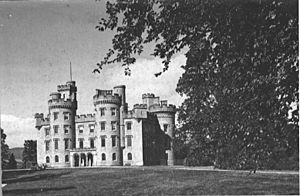John Gordon (soldier) facts for kids
John Gordon (born around 1776 – died 16 July 1858) was a Scottish soldier and a Tory politician. A Tory politician was someone who belonged to the Tory political party in Britain. This party usually supported traditional ideas and the power of the monarchy.
Contents
Early Life and Military Career
John Gordon was the son of Charles Gordon, who owned estates in Braid and Cluny, Scotland. His mother was Johanna Trotter.
Gordon started his military career in 1800.
- He became a 2nd lieutenant in the Royal Aberdeenshire Light Infantry.
- In 1804, he was a lieutenant in the 7th Company of the 55th Aberdeenshire Militia.
Grand Tour and Famous Ship
In 1804, John Gordon went on a long journey, often called a "grand tour." He traveled to Egypt and even carved his name on some ancient monuments there. When he returned home, he sailed on HMS Victory. This famous ship also carried the body of Admiral Horatio Nelson, a British naval hero who had died in battle. Gordon arrived back in England in December 1805.
He continued to rise in the military ranks:
- He became a major on 11 August 1808.
- He was promoted to lieutenant-colonel on 6 June 1820.
- In 1836, he became an Honorary Colonel.
Landowner and Member of Parliament
When his father passed away in 1814, John Gordon inherited his family's lands, including Cluny Castle. He was already quite wealthy because he had also inherited money and property from his uncle, who was a merchant in the British West Indes.
Gordon bought even more land, including the islands of North and South Uist, Benbecula, and Barra in Scotland.
Landlord and the Highland Clearances
John Gordon was seen as a good landlord to the people living on his properties in Aberdeenshire. However, he was also involved in a sad part of Scottish history called the Highland Clearances. During this time, many Gaelic-speaking families in the Hebrides (a group of islands off the coast of Scotland) were forced to leave their homes.
For example, about 3,000 people from his estates on the Outer Hebrides were made to move to Canada in 1851.
Slavery and Compensation
A significant change happened in 1833 when the British government passed the Slavery Abolition Act 1833. This law made slavery illegal throughout most of the British Empire. Because of this, John Gordon received a payment of £24,964. This money was given to him because he had owned six plantations on the Caribbean island of Tobago, where 1,383 enslaved people had been forced to work.
Political Career
From 1826 to 1832, John Gordon served as a Member of Parliament (MP). An MP is a person elected to represent a group of people in the country's parliament. He represented the area of Weymouth and Melcombe Regis.
Later Life
John Gordon never married. He passed away on 16 July 1858. His eldest son, also named John Gordon, was the only one of his children who lived longer than him. After John Gordon's death, the Cluny estate went to Lady Emily Gordon Cathcart. She continued the policy of people having to leave their homes, with many moving to Saskatchewan in Canada.
 | Delilah Pierce |
 | Gordon Parks |
 | Augusta Savage |
 | Charles Ethan Porter |


